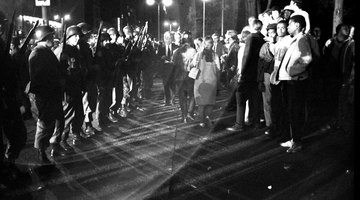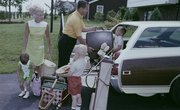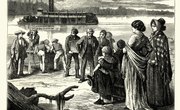The 20th century was jam-packed with world-changing events and issues -- but the 1960s was an especially-tumultuous decade. From large-scale demonstrations to conflicts with the U.S.S.R., the social and cultural issues of the time made the 1960s memorable in a number of ways.
The Space Race
The race into space was fueled by the United States' rivalry with the Soviet Union during this era. The Soviets sent their first artificial satellite into space in 1957 -- prompting the U.S. to hasten into the game. Alan Shepard became the first American in space in 1961. In 1963, John Glenn was the first American to orbit the Earth, and in 1969, the crew of Apollo XI became the first men to land on the moon.
The Cold War
The U.S. also butted heads with Cuban leader Fidel Castro during this time. In 1961, President John F. Kennedy, elected as the nation's first Catholic president, sent a team of Cuban exiles into Cuba to stop Castro -- a fiasco that ended with the exiles being captured. That incident, dubbed the Bay of Pigs invasion, heightened tensions between the U.S.S.R. and the U.S. In 1961, the Berlin Wall was erected to divide Soviet-controlled East Germany from western-controlled West Germany. Other conflicts included the Cuban Missile Crisis in 1962, when the Soviets pointed nuclear missiles at the U.S. from Cuba. In 1963, President Kennedy was assassinated -- a huge blow to the American people.
Civil Rights
The decade will be remembered by many as an era of breakthroughs for marginalized people, most notably, people of color and women. Dr. Martin Luther King Jr. became the face of the anti-segregation movement, and his influence helped pave the way for the desegregation of schools and other institutions. Meanwhile, books such as "The Feminine Mystique" motivated women to fight for more equality and to adopt a feminist perspective. In 1964, the Civil Rights Act was changed to bar discrimination based on gender. Hispanic farm workers, meanwhile, were empowered by the work of Cesar Chavez, who formed the United Farm Workers Association.
The Vietnam War
Politically, perhaps no other issue was quite as contentious as the conflict in Vietnam. Starting in 1965, troops began to be sent to the country in great numbers, resulting in a mandatory draft. Men opposed to the war fled the U.S. to escape the draft, and massive anti-war protests took place on a regular basis. Members of the peace and environmental justice movements included the "hippies" who made the East Village of New York and the Haight-Ashbury neighborhood of San Francisco their home.
Youth Culture
In the 1960s, many of the babies born after World War II were teenagers or young adults with very different mindsets than the previous generation. Their parents were conservative and traditional, but that was not the case for many youths during the time. Young people questioned everything, from the traditional gender roles in the family to the methods of education. That break from the traditional resulted in the evolution of rock 'n' roll, more liberal film and literature, and a new appreciation of non-Western ideas, such as the the transcendental meditation and consciousness movement. Some have even posited that in the '60s, the liberal values took the place of more traditional religions.
Related Articles
References
Writer Bio
Nicole Vulcan has been a journalist since 1997, covering parenting and fitness for The Oregonian, careers for CareerAddict, and travel, gardening and fitness for Black Hills Woman and other publications. Vulcan holds a Bachelor of Arts in English and journalism from the University of Minnesota. She's also a lifelong athlete and is pursuing certification as a personal trainer.











